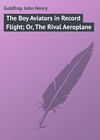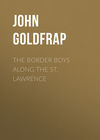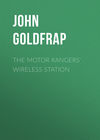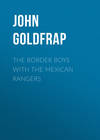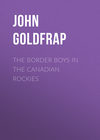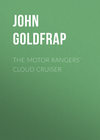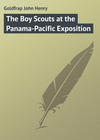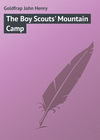Read the book: «The Boy Aviators in Record Flight; Or, The Rival Aeroplane», page 10
CHAPTER XXV.
A FIGHT FOR FORTUNE
The sheriff of Calabazos was sitting on the stoop outside the Government Assay Office early the next day when he was startled by a loud clatter of hoofs up the mountain side. He looked up from his absorbing occupation of whittling a piece of wood, and saw coming rattling down the trail at a breakneck speed four horsemen. They were Noggy Wilkes, Hank Higgins, Fred Reade and Luther Barr.
“Hullo, Chunky,” hailed the sheriff to the government clerk, who was inside the office – a rough, clap-boarded affair on which appeared a sign, which announced in white letters that it was the “GOVERNMENT ASSAY OFFICE.” “Come on out here, Barton, here come them fellers that got here yesterday with that thar skyscraper thing of theirn and purty near bothered the life out of Skol Scovgen, the blacksmith, trying to git him to make a conniption of some kind for it.”
The young man who languidly consented to serve Uncle Sam in the capacity of claim clerk joined him on the porch. He also gazed interestedly at the group of horsemen, who were now compelled to slow up by the steepness of the trail.
“Seem ter be in quite a hurry,” he commented, picking his teeth with a quill pick that he had acquired on his last visit to what he was pleased to term civilization.
“Yep,” assented the sheriff, “I reckon they’ve bin up stakin’ out a mine or suthin’. I hear they was talking in ther hotel last night while it was rainin’ so pesky hard about a lost mine and some chap named Witherbee.”
“Oh, I remember that feller Witherbee,” struck in the clerk. “Went east a while ago. I recollect that the gossip was that he’d made quite a piece of money on a mine or had some sort of mine hidden back in the hills thar. I heard it was the one that belonged to old Fogg, who disappeared.”
“Wall, ther fellers seem to have something of ther same kind on their minds,” exclaimed the sheriff, as the party, having now left the uneven trail, came clattering down the road on their wiry horses.
It could now be seen that Luther Barr, who rode in advance of the rest, carried some sort of a paper in his hand. The arrival of the cortege had attracted quite a crowd, who gathered about the Assay Office as the riders came clattering up.
“Is this the Government Assay Office?” queried Luther Barr as they drew rein and dismounted.
“Reckon so,” replied the dandified clerk with a languid air.
“Oh, you reckon so, do you?” was the impatient reply. “Well, kindly bestir yourself a little. I wish to file a claim to a mine.”
“Yep – Got ther papers all made out regilar?”
“Yes, here they are. We’ve gotten them all right and correct. I guess there’ll be no trouble about that part of it, eh, Reade?”
“I guess not,” answered the individual addressed, tying his horse to the hitching bar in front of the assay office.
“All right, gentlemen,” at length remarked the clerk, getting to his feet, “I guess if you come inside we can fix you up.”
“Say, partner,” put in the sheriff, “yer don’t mind my askin’ you a question, do yer?”
“Not at all,” beamed Luther Barr, who was in high good humor, “ask a dozen.”
“Wall, is this yar mine yer goin’ ter locate the ‘Lost Mine’ that old Jared Fogg, who disappeared, used ter own?”
“I believe it is. Why do you ask?”
“Wall, if you’ll excuse my jay-bird curiosity, I’d jes like to know how in thunder you ever located it.”
“That is our secret, my man,” replied the eastern millionaire briskly. “All you need to know, and this gentleman here, is that we have it legally located, isn’t it?”
“Beg your pardon,” remarked the sheriff. “No harm done?”
“Oh, none at all,” smiled Barr. “And now, I think we’ll go in and make the deal final.”
They entered the office with the clerk, Hank Higgins and Noggy Wilkes remaining outside.
As Barr and Reade passed into the office the former whispered to Hank Higgins.
“Now you and Wilkes do your duty. I don’t anticipate any interruption, but if there is any – ”
The two western ruffians tapped the butts of their Colts knowingly.
“We’ll attend to that, guv’ner,” they assured him.
Silence fell on the village street after Barr and Reade had entered the office. The crowd outside stood gaping in curiosity as to what could be the business that had brought the strangers galloping in such evident haste to the assay office. The sheriff, with a side glance at Hank Higgins and Noggy Wilkes, resumed his whittling.
Suddenly the quiet was broken by the sharp chug-chug of an approaching automobile.
“Here comes a choo-choo cart,” remarked the sheriff, springing to his feet and peering up the road.
“That’s what it is,” answered a man in the crowd, “and coming like blue blazes, too.”
As he spoke, the boys’ auto swept round a wooded curve and came tearing along toward the assay office. In the tonneau stood Bart Witherbee, his face strained and eager, and holding a crumpled paper in his hand. Frank was at the wheel and the other boys were beside their miner friend in the tonneau.
“Seem ter be in a hurry,” drawled the sheriff, as the party swept up to the low porch, the crowd falling back to make way for them with wondering glances.
Luther Barr’s lean face appeared at the dusty window of the Government Office.
“A hundred dollars if you file that claim in time,” he shouted to the astonished clerk, who thought the old man had gone suddenly mad.
Bart Witherbee made a flying leap from the auto, and almost before it stopped had raced up the steps. But before he could gain the door of the assay office he found himself looking into the muzzles of two revolvers held by Hank Higgins and Noggy Wilkes.
“Don’t come no further, pardner,” grinned Hank. “It might be onhealthy for you.”
“Here, here; what’s all this?” growled the sheriff. “I don’t allow no shooting in my bailiwick. Put up them guns.”
“Let me get by, Hank Higgins,” exclaimed Bart Witherbee angrily.
“Hey, there; what’s that name you mentioned, partner?” asked the sheriff eagerly.
“Hank Higgins, and there’s his partner, Noggy Wilkes,” exclaimed the miner. “The third one, Bill Jenkins, is in jail.”
“Wall, if here ain’t a bit of Christmas luck,” shouted the sheriff exultingly. “I want ’em both for a dozen crimes. Here, you; you’re under arrest. Don’t move or I’ll fire.”
But Noggy Wilkes, with a desperate leap, had gained the side of his horse that stood, western fashion, unhitched, with the reins lying on the horn of his saddle. With one bound the desperado was mounted and galloping off down the trail. The sheriff sent two bullets after him, but both missed. Hank Higgins, however, was not so fortunate. With a muttered:
“I guess you got me right, sheriff,” he submitted to arrest.
In the meantime, Bart Witherbee had burst like a whirlwind into the Government office, upsetting a desk and spilling a bottle of ink over Luther Barr, who had angrily intercepted him.
“Don’t file that claim to Fogg’s mine,” he shouted, waving his papers above his head. “I’ve got a prior one.”
“You have – where?” gasped the astonished clerk.
“File that claim,” ordered Luther Barr. “I’ll report you to Washington if you don’t.”
“Hold your horses,” replied the clerk easily, “there seems to be some sort of dispute here. Do you lay claim to the mine?” he asked, turning to Witherbee.
“I sure do,” replied the miner, “and here’s my claim – the last will and testament of Jared Fogg, otherwise Jack Riggs. He leaves his mine and the treasure he has secretly hoarded from it and buried under the floor of his hut to me.”
“And who might you be?” asked the clerk eagerly.
“I am Bart Witherbee, and can easily prove it,” replied the miner, drawing from his pocket a number of papers.
The clerk quickly perused them and also the will.
“What time did you stake the mine?” he asked, suddenly turning to Luther Barr.
“At daylight to-day,” replied the millionaire. “I guess we win.”
“I guess not,” snapped back Witherbee. “Old man Fogg died shortly after midnight, as I can easily prove, and therefore the will became operative at that time.”
“I see you know some law,” remarked the clerk. “I guess, Mr. Barr, your claim is not valid.”
But Barr, raging furiously, had gone.
Outside the door he saw the boys. Beside himself with rage, he shook his fist at them. His rage was too intense to permit him to speak. The sheriff and everybody in the crowd insisted on shaking hands with Bart Witherbee and hearing again and again his strange story and the details of how the will had been found hidden in the hut. At last, however, accompanied by the sheriff, whose duty it was in that rough community to look after old Fogg’s, or Jack Riggs’ body, the boys and their miner friend managed to tear themselves away and sped back to the hermit’s hut in their auto. They found everything as they had left it, and, on tearing up the floor, according to the instructions left in the old man’s will, they found that a huge pit had been dug there, which was filled to the brim with ore which the old miser had painstakingly carried through his tunnel from his mine. A rough estimate valued it at $350,000.
“How do you suppose Luther Barr ever managed to locate the mine?” asked Frank wonderingly.
“That puzzled me, too, at first,” said the sheriff, “but now, since I have found that Hank Higgins and Noggy Wilkes knew Wild Bill Jenkins, it is a mystery no longer. Wild Bill boasted some time ago that he knew where the mine was, but he was forced to become a fugitive from justice before he had time to file any claim to it.”
Suddenly the voice of Billy Barnes, who had wandered out onto the trail with a rifle, was borne to their ears:
“Boys! Boys! Come quick!” he cried. There was urgent entreaty in his tone.
CHAPTER XXVI.
THE SAND STORM
Rushing out in the direction of the cries, the boys found Billy struggling in the grasp of Fred Reade, Luther Barr, and Slade, while the red-headed mechanic was striking at the aeroplane with a big wrench.
“There! If we can’t fly any more, no more can you,” he exclaimed viciously, making a savage smash at the engine. There was a sound of splintering metal.
“Consarn ’em, they’re trying to bust up our aeroplane,” yelled Bart Witherbee, making a dash at the group.
As they saw the boys and their companions coming the men took to their heels, Reade alone looking back to shout out:
“Now you can’t fly, either. You’re out of the race.”
This the boys construed to mean that the Slade aeroplane was too badly crippled to fly. And so they afterwards learned. The engine had developed a serious flaw, and one of the cylinders was cracked from top to bottom. In the part of the country in which they were it would, of course, have taken weeks to get a new engine.
“Shall we chase them?” asked Harry.
“No, it would be useless. Hark! they’re in their auto now, and would be away ahead of us by the time we got after them,” rejoined Frank.
The sound of an auto’s exhaust rapidly growing fainter reached their ears. It was the last they saw of Luther Barr and his gang, for that night they left Calabazos and making their way to the railroad took a train east. The skeleton of Slade’s unlucky aeroplane still remains in the little settlement, and greatly puzzles visitors there, some of whom think it is the framework of some extinct animal.
Billy Barnes soon told how, while shooting in the woods, he had heard an auto coming up the trail, and suspecting some mischief had hastened to the spot where the aeroplane had been left. He found his surmise correct when Barr and his companions suddenly emerged from the woods and began their attempt to wreck the craft. Before Billy, who indignantly sprang forward, could seize the arm of the vandal with the wrench, he had been seized. Luckily he had time to cry out before they thought of stopping him, and so the aeroplane was saved from serious damage. It was found, in fact, that the blow aimed at it had done no worse harm than to splinter a spark plug, which was soon replaced.
That afternoon the boys, leaving Bart Witherbee and the sheriff to make an inventory of the dead miner’s effects and to explore the tunnel, which was found to be a wonderful piece of work, the boys motored down to the settlement and sent out telegrams seeking information of the whereabouts of the dirigible. It was not till late evening that they received from Doolittle, a small town about forty miles from Calabazos, information that the big gas-lifted craft had laid up there for repairs, but was ready to start early the next day.
To the boys who had feared that the rival must have been almost in San Francisco by that time this was cheering news, and the Golden Eagle’s planes were hurriedly readjusted, as she was put in shape for a continuation of her trip. Early the next day the start was made. Bart Witherbee was left behind at his mine, in which he had insisted on the boys, much against their will, each taking a share. Old Mr. Joyce also received a large enough portion of the general good luck to secure him from want and give him ample leisure to work out his queer inventions. The Witherbee mine – he calls it the Aeroplane – is now one of the most famous in the west.
The boys had determined to shape their course by Doolittle, as it was on their direct path westward, and they wished also to get out of the mountainous region of the foothills. As Doolittle came in sight they had an opportunity to view their rival for the first time in many days. Her big red gas bag showed like a bright crimson flower above the sober gray of the prairie town. That their rivals had sighted them was soon made evident by the fact that a flag was run up on the single staff the town possessed and the citizens wheeled out a rusty old cannon and began firing it like mad. When the boys were within a mile of the town they made ready to drop messages which, as they sailed above, they cast down. They could see the people scrambling furiously for them.
“I hope they leave enough of them to send back home,” laughed Harry as they saw the wild struggle.
That day was to be a memorable one for the town of Doolittle. As the aeroplane passed above it, the faithful escorting auto not far behind, the big dirigible also was shot into the air.
Mr. McArthur from his deck waved a greeting to the boys and hailed them through a megaphone.
“Glad to see you,” he hailed. “Hurray, for ’Frisco!”
All that afternoon the two ships sailed along in company, the boys’ aeroplane slightly in the lead. As the sun sank lower a big bank of clouds arose toward the north and the sun glowed with a peculiar red light.
A light breeze also sprang up, but instead of being cooling it was as hot as if it had blown from an oven door.
“We’re in for a storm,” remarked Frank, “or I’m very much mistaken.”
“What, a regular rain and wind storm?” asked Harry. “I thought they only had those in the hills in this part of the country.”
“They have a worse thing than that,” said Frank apprehensively, “a sand storm, and that’s what may be coming.”
“McArthur doesn’t seem to be worrying,” remarked Harry, glancing up at the dirigible, which was sailing slightly above them.
“No,” said Frank, “that’s a fact. Maybe I am mistaken, after all. Anyhow, we’ll keep on as long as he does.”
But half an hour later the boys wished they had alighted. The wind came in sharp, hot puffs from the north, and had it not been for the Joyce gyroscopic balancer they carried, the ship would have been in hard straits. As it was, when Frank wished to make a landing he dared not risk it. The air, too, grew so thick that he could not see the earth beneath them.
Stinging particles of sand drove into their eyes, blinding them and gritting between their teeth. The wind grew stronger, and as it did so the air grew black as night with the sand with which it was impregnated.
So dark was it, in fact, that when night came and found them still in the air, unable to make a landing, there did not seem to be any perceptible difference.
The aeroplane drove rigidly before the howling wind. Her speed was terrific. Neither boy spoke after their first expressions of alarm, but devoted their entire attentions to keeping the aeroplane from capsizing.
“Keep cool, Harry,” said Frank at length. “We may come out of it all right.”
“Where are we being driven?” asked the other lad.
“To the south at a terrific pace, too. If the gasolene holds out we may manage to live out the storm, but I don’t know where we will be driven to.”
“What lies to the south of us?” asked Harry, after another long pause, during which the storm-stressed aeroplane made several sickening lurches, always recovering herself in time, however, thanks to the gyroscope.
“Why, about as desolate a country as can be imagined. Nothing but arid wastes and cactus.”
“It will be a bad lookout, then, if we have to land there.”
“It certainly will,” was the laconic response.
On and on through the darkness drove the storm-tossed aeroplane, carrying her two young navigators into the unknown.
CHAPTER XXVII.
WINNING THE PRIZE. —Conclusion
It was at four o’clock in the morning by the auto clock affixed to the chassis that Frank noticed the wind begin to drop. At the same time the stinging of the sand decreased perceptibly. The storm was waning.
He awakened Harry, who had fallen into a troubled doze, and gave him the cheering news. But even if the storm had blown itself out with the coming of daylight there was not much else to cheer the boys’ hearts, for as it grew lighter and the air cleared and they found themselves able to make out what was beneath them, Harry uttered an exclamation of dismay:
“Look there!” he shouted, pointing downward.
The aeroplane was traveling over a gray waste which Frank at once realized was the sea. The question was: Was it the open ocean or the Gulf of California? It did not seem possible it could be the Pacific as, even at the terrific pace they had been carried along in the preceding twelve hours, it seemed hardly possible that they could have been blown across the long peninsula of Lower California.
On either hand, they could make out, as the light grew stronger, a thin, faint line of coast, and therefore Frank’s surmise was proven correct. The boys decided to make for the land on their left, as Frank had heard that the natives of the peninsula itself were little better than savages, and not overpleased to see strangers. The land to the left on the contrary must be Mexico, where they could probably find a railroad or at least the means of transportation to one.
It was afternoon when they drew near to the coast. Not far inland they could see among the barren hills, dotted here and there with cattle, a small village. It was a mere huddle of roofs, but at least it meant food and shelter, and the boys relied on being able to find a telegraph station from which they could send out a message to relieve the anxiety of the friends they knew must be extremely concerned for their safety by this time.
Suddenly as the outlines of the melancholy-looking hills grew plainer and plainer the engine, which had been working badly, gave symptoms of stopping altogether.
The boys exchanged worried looks. Beneath them was an expanse of water without a boat on its surface, and though both of them were strong swimmers, they could not dream of reaching the shore should their aeroplane plunge downward.
It was a serious situation.
Harry tinkered with the engine, and it began to run a little better for a short time, but soon began to gasp and cough, as if in mortal distress.
“What can be the matter with it?” puzzled Harry. “Everything, ignition, lubrication and all seems to be all right.”
“I have it,” suddenly cried Frank.
“What is it?”
“The gasolene is running out!”
Sure enough there was hardly more than a few spoonfuls of the fuel left.
“There’s some alcohol in the locker. We had it for the stove. Let’s try that,” suggested Harry.
The alcohol was dumped into the tank and gave them a little more fuel, but the shore still looked far away.
Lower and lower sagged the aeroplane under her decreased speed, till as they reached the shore it seemed that she was hardly skimming the waves, but she bravely struggled on, and as the engine gave a final gasp and came to an abrupt stop, the Golden Eagle settled down on a sandy beach.
“Well, here we are,” said Frank, “and none too soon.”
“Now, let’s go and see what sort of folks they are in that village,” said Harry. “I’m famished, and my mouth is as parched as a bit of dried orange peel.”
“Same here,” said Frank, as the boys set out for the interior which was hidden from them by sand dunes, topped with a sort of sharp bladed grass that cut like a knife.
The village they found to be a mere collection of shacks, with pigs roaming about its streets, and skinny cattle poking their noses into the house doors. They were received hospitably enough, however, and although they could not talk Spanish, managed to make their wants understood, more especially when they showed some gold.
The wonder of the villagers knew no bounds when, after they had refreshed themselves, the boys showed them the aeroplane and pointed to the sky. The Mexicans were too polite to say so, but it was clear that they thought the boys were fabricators, though how they imagined they had landed in their village was a matter of speculation.
That night they managed to secure a cart and, having packed the Golden Eagle, set out for the railroad, which the Mexicans assured them was “far, far away,” as a matter of fact, it was not more than sixty miles, and the next day, late in the evening, two very dusty, very ragged, very tired boys got out of the plodding ox cart at Torres, a small town on the Sonora Railroad, and almost frightened the native operator to death by their vehement demands to file messages.
“To-morrow, to-morrow,” he kept saying, but the talisman of a good, big tip kept him at work.
In the meantime the auto had gone as far adrift in the sand storm as the boys, very nearly, and the state of mind of its occupants can be imagined when they found after the storm had cleared that they had traveled miles in the wrong direction and were near to Gila Bend on the Southern Pacific Railway, with no more idea as to what had become of their young companions than they had of the direction in which the aeroplane had been blown.
Telegrams were sent out broadcast by Billy and Lathrop, but no news was had of the Golden Eagle. Lathrop suggested sending word east of the boys’ plight, but Billy overruled this.
“They may turn up all right,” he said, “and if they do, we shall have alarmed their parents for nothing.”
The next day, however, while Frank and Harry were plodding across Mexico in their ox cart, Billy became so anxious that he sent word to the Planet, asking them to notify him at once if word was heard of the boys, as he knew that they would wire the paper as soon as they landed anywhere. No word had been received by the paper, however, and it was a gloomy party that sat on the porch of the little hotel at Gila Bend that afternoon and evening. After a troubled sleep Billy emerged onto the street in the early morning and was met by a ragged station agent.
“Be your name Barnes?” he asked.
“That’s me,” said Billy, wondering what the man could want.
“Then I’ve got a message for yer. It come late last night, but I didn’t want to wake yer.”
“And you’ve been holding it all this time?” indignantly demanded Billy, guessing at once that it was news.
“Wall, yer wanted yer sleep, didn’t ye?” demanded the man.
Eagerly Billy tore the envelope open. It was from Mr. Stowe.
“Great news. Boys safe. Win the prize for longest flight. Dirigible smashed in storm near Parkerville, Arizona. McArthur and crew safe. Congratulations.
Stowe.“
There is little more to tell. My readers can imagine for themselves the scene when two days later the boys met at Tucson. Over a merry meal they “fought their battles o’er again,” and discussed every strange adventure of their record flight a dozen times. Their parents had been notified of their safety, and were to meet them in Los Angeles.
“Well, this trip certainly has panned out,” said Frank, as the subject of Bart Witherbee and his mine came up.
“And here we are, all together, safe and sound. At one time I thought we were goners sure,” remarked Harry.
“One time!” exclaimed Billy with a laugh. “A dozen at least.”
“I’d like to start out on another trip to-morrow,” exclaimed Lathrop enthusiastically.
“I’d make some new inventions for it,” said Mr. Joyce.
“Here, too,” cried Billy. “Do you think we will have any more adventures?”
“Sure to,” said Frank.
The boys did, and sooner than they expected to. As they were talking there came a rap at the door.
“Telegram from Captain Robert Hazzard for Mr. Chester,” said a grinning bell boy.
“Captain Hazzard?” said Harry, puzzled.
“Oh, I remember now!” exclaimed Frank as he glanced over the message. “It’s that army officer who was chasing the Indians, and who spoke about the South Pole. I suppose he got our address from the papers.”
“What does he say?” demanded Billy.
“Look here,” cried Frank enthusiastically. “What do you think of that?”
